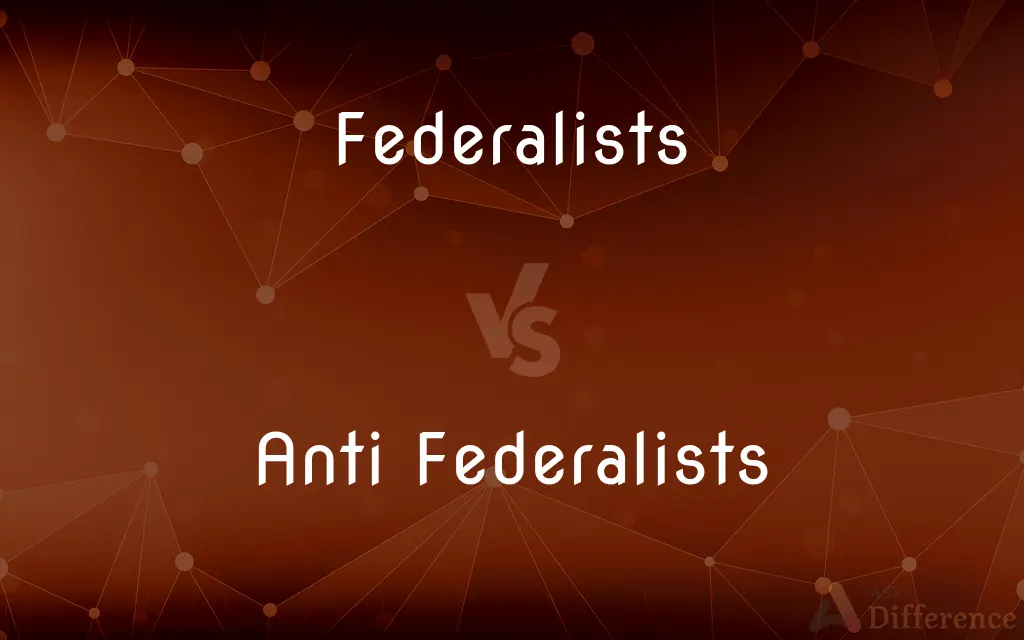Federalists vs. Anti Federalists — What's the Difference?
By Maham Liaqat & Fiza Rafique — Published on September 8, 2024
Federalists advocated for a strong central government, while Anti-Federalists sought more power for state governments.

Difference Between Federalists and Anti Federalists
Table of Contents
ADVERTISEMENT
Key Differences
The Federalists, led by figures such as Alexander Hamilton and James Madison, were proponents of ratifying the United States Constitution, advocating for a strong national government that would have substantial powers over the states. They believed this structure was necessary to maintain order and ensure the young nation's survival on the international stage. On the other hand, the Anti-Federalists, including leaders like Patrick Henry and George Mason, were skeptical of a centralized authority, fearing it could lead to tyranny reminiscent of British rule. They argued for the preservation of states' rights and liberties, insisting on a Bill of Rights to protect individual freedoms.
The Federalists emphasized the inefficiencies and weaknesses of the Confederation government, arguing that a stronger federal government was essential for economic stability, national defense, and international respect. Conversely, Anti-Federalists highlighted the risks of centralized power, worrying it would erode state authority and individual liberties without proper checks and balances.
In terms of ratification debates, Federalists managed to sway public opinion through the publication of the Federalist Papers, a series of essays arguing for the Constitution's merits. The Anti-Federalists responded with their own writings, warning of the dangers of a too-powerful central government and the lack of explicit protections for individual rights.
The eventual compromise, leading to the Constitution's ratification, included the promise to add a Bill of Rights, addressing the Anti-Federalists' concerns about protecting individual liberties. This demonstrated the Federalists' willingness to incorporate feedback to create a more united nation.
While the Federalists envisioned a diversified economy with a strong manufacturing sector, supported by a central banking system, the Anti-Federalists preferred an agrarian society with local economies less influenced by a central bank's policies.
ADVERTISEMENT
Comparison Chart
Goal for Government
Strong central government
Strong state governments, weak central government
Leaders
Alexander Hamilton, James Madison, John Jay
Patrick Henry, George Mason, Samuel Adams
View on the Constitution
Supported ratification
Opposed ratification without a Bill of Rights
Economic Vision
Diversified economy with a central bank
Agrarian society, skeptical of central banking
Papers/Publications
The Federalist Papers
Various pamphlets and letters opposing ratification
Compare with Definitions
Federalists
Believed in indirect elections.
Federalists preferred senators to be chosen by state legislatures.
Anti Federalists
Opposed immediate ratification of the Constitution.
Anti-Federalists demanded a Bill of Rights first.
Federalists
Advocates for a strong central government.
Federalists pushed for the ratification of the U.S. Constitution.
Anti Federalists
Advocates for strong state governments.
Anti-Federalists fought for states' rights and powers.
Federalists
Supported a diversified economy.
Federalists advocated for the establishment of a national bank.
Anti Federalists
Favored direct elections.
Anti-Federalists wanted elected officials to be chosen directly by the people.
Federalists
Favored a strong executive branch.
Federalists supported a presidency with significant powers.
Anti Federalists
Sought limited executive power.
Anti-Federalists were wary of a strong presidency.
Federalists
Supported international engagement.
Federalists were pro-treaties and engaging in foreign diplomacy.
Anti Federalists
Preferred local over central economic policies.
Anti-Federalists opposed the creation of a national bank.
Federalists
An advocate of federalism.
Anti Federalists
Plural of anti-federalist
Federalists
Federalist A member or supporter of the Federalist Party.
Federalists
Of or relating to federalism or its advocates.
Federalists
Federalist Of or relating to Federalism or Federalists.
Common Curiosities
Who were the Federalists?
The Federalists were supporters of a strong central government and advocates for the ratification of the U.S. Constitution.
What did the Anti-Federalists stand for?
The Anti-Federalists favored strong state governments and were concerned about individual liberties, demanding a Bill of Rights.
Why did Anti-Federalists oppose the Constitution initially?
They feared it gave too much power to the national government at the expense of states' rights and lacked specific protections for individual freedoms.
What was the main concern of the Federalists?
The Federalists were primarily concerned with the weaknesses of the Articles of Confederation and sought a more effective national government.
What economic policies did Federalists support?
Federalists supported a diversified economy, the establishment of a national bank, and federal fiscal policies.
How did Federalists and Anti-Federalists view military power?
Federalists favored a strong standing army, while Anti-Federalists were concerned it could be used to oppress the people.
How was the dispute between Federalists and Anti-Federalists resolved?
The dispute was resolved by adding the Bill of Rights to the Constitution, ensuring protections for individual liberties.
How did Anti-Federalists view the economy?
Anti-Federalists preferred an agrarian society and were skeptical of central banking and federal control over the economy.
What was the Federalist Papers?
A series of essays written by Hamilton, Madison, and Jay promoting the ratification of the U.S. Constitution.
Did Federalists support a Bill of Rights?
Initially, Federalists did not see the need for a Bill of Rights, but they agreed to it as a compromise to secure the Constitution's ratification.
Who were some prominent Federalists?
Alexander Hamilton, James Madison, and John Jay were among the most notable Federalists.
What role did compromise play in the ratification of the Constitution?
Compromise, especially the promise to add a Bill of Rights, was crucial in securing enough support for the Constitution's ratification.
What legacy did the Federalists and Anti-Federalists leave?
Their debates shaped the foundation of American governance, emphasizing the balance between central authority and states' rights, and the importance of individual liberties.
Did the Anti-Federalists have a unified platform?
While unified in their opposition to the Constitution as initially proposed, their views varied on other issues, including the specifics of state and individual rights.
Who were some key Anti-Federalists?
Patrick Henry, George Mason, and Samuel Adams were key figures among the Anti-Federalists.
Share Your Discovery

Previous Comparison
To vs. With
Next Comparison
Prebiotic vs. ProbioticAuthor Spotlight
Written by
Maham LiaqatCo-written by
Fiza RafiqueFiza Rafique is a skilled content writer at AskDifference.com, where she meticulously refines and enhances written pieces. Drawing from her vast editorial expertise, Fiza ensures clarity, accuracy, and precision in every article. Passionate about language, she continually seeks to elevate the quality of content for readers worldwide.












































